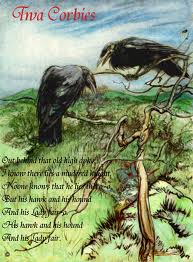Twa Corbies- Sharpe (Scotland) 1803 Child A a.

Twa Corbies Child A a.
a. Minstrelsy of the Scottish Border, in, 239, ed. 1803, communicated by C.K. Sharpe, as written down from tradition by a lady.
1 As I was walking all alane,
I heard twa corbies making a mane;
The tane unto the t'other say,
'Where sail we gang and dine to-day?'
2 'In behint yon auld fail dyke,
I wot there lies a new slain knight;
And naebody kens that he lies there,
But his hawk, his hound, and lady fair.
3 'His hound is to the hunting gane,
His hawk to fetch the wild-fowl hame,
His lady 's ta'en another mate,
So we may mak our dinner sweet.
4 'Ye'll sit on his white hause-bane,
And I'll pike out his bonny blue een;
Wi ae lock o his gowden hair
We'll theek our nest when it grows bare.
5 'Mony a one for him makes mane,
But nane sail ken where he is gane;
Oer his white banes, when they are bare,
The wind sail blaw for evermair.'
The Two Crows (Translation- David Watson Hood)
As I was walking all alone,
I heard two crows (or ravens) making a moan;
One said to the other,
"Where shall we go and dine today?"
"In behind that old turf wall,
I sense there lies a newly slain knight;
And nobody knows that he lies there,
But his hawk, his hound and his lady fair."
"His hound is to the hunting gone,
His hawk to fetch the wild-fowl home,
His lady's has taken another mate,
So we may make our dinner sweet."
"You will sit on his white neck-bone,
And I'll peck out his pretty blue eyes;
With one lock of his golden hair
We'll thatch our nest when it grows bare."
"Many a one for him is moaning,
But nobody will know where he is gone;
Over his white bones, when they are bare,
The wind will blow for evermore."
__________________
THE TWA CORBIES [Scott's Minstrelsy of the Scottish Border, in, 239, ed. 1803]
This poem was communicated to me by Charles Kirkpatrick Sharpe, esq. jun. of Hoddom, as written down, from tradition, by a lady. It is a singular circumstance, that it should coincide, so very nearly, with the ancient dirge, called the Three Ravens, published by Mr Ritson,in his-^ncient Songs; and that, at the same time, there should exist such a difference, as to make the one appear rather a counterpart than copy of the other. In order to enable the curious reader to contrast these two singular poems, and to form a judgment which may be the original, I take the liberty of copying the English ballad from Mr Ritson's collection, omitting only the burden and repetition of the first line. The learned editor states it to be given " From Ravencroft's Melismata. Musical phan" siesfitting the cittie and country, humodrs to 3, 4, and " 5 voyecs, London, l6ll, 4to. It will be obvious (con" tinues Mr Ritson) that this ballad is much older not " only than the date of the book, but most of the other " pieces contained in it." The music is given with the words, and is adapted to four voices.
There were three rauens sat on a tre,
They were as blacke as they might be:
The one of them said to his mate,
"Where shall we our breakefast take!"
"Downe in yonder greene field,
There lies a knight slain under his shield;"
" His hounds they lie downe at his feete,
So well they their master keepe;"
"His haukes they flie so eagerly,
There's no fowle dare come him nie."
"Down there comes a fallow doe,
As great with yong as she might goe,"
"She lift up his bloudy hed,
And kist his wounds that were so red."
"She got him up upon her backe,
And carried him to earthen lake."
"She buried him before the prime,
She was dead her selfe ere euen song time."
"God send euery gentleman,
Such haukes, such houndes, and such a leman."
Ancient Songs, 1792. p. 155. I have seen a copy of this dirge much modernized.
THE TWA CORBIES
As I was walking all alane,
I heard twa corbies making a mane,
The tane unto the t'other say,
"Where sail we gang and dine to-day ?"
"In behint yon auld fail [1] dyke,
I wot there lies a new slain knight;
And nae body kens that he lies there,
But his hawk, his hound, and lady fair.
"His hound is to the hunting gane,
His hawk to fetch the wild-fowl hame,
His lady's ta'en another mate,
So we may mak our dinner sweet.
"Ye'll sit on his white hause bane [2],
And I'll pike out his bonny blue een:
Wi' ae lock o' his gowden hair,
We'll theek [3] our nest when it grows bare."
Mony a one for him makes mane,
But nane sail ken whare he is gane:
O'er his white banes, when they are bare,
The wind sail blaw for evermair."
Footnotes:
1. Fait=Turf
2. hause-bane = collar bone
3. theet= thatch